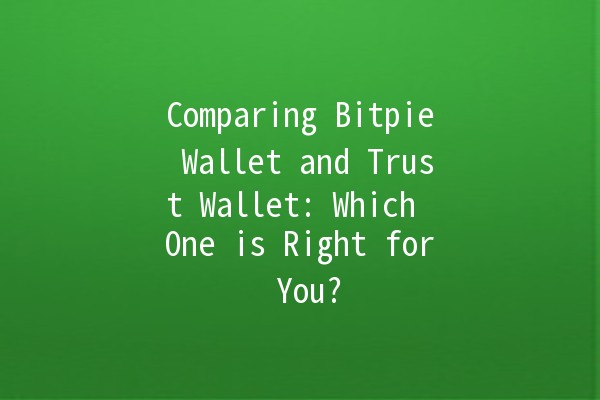
In the everevolving world of cryptocurrency, choosing the right wallet is crucial for securing your digital assets. Among many options available today, Bitpie Wallet and Trust Wallet stand out as two popular choices among users. Each wallet has its unique features, advantages, and shortcomings. In this comprehensive comparison, we will delve into the core functionalities, security measures, user experience, and additional features of both wallets to help you decide which one suits your needs best.
Understanding Bitpie Wallet
Overview
Bitpie Wallet is a noncustodial cryptocurrency wallet that was created in response to the growing demand for secure and userfriendly digital asset management. It supports multiple cryptocurrencies, making it a convenient choice for users looking to manage various coins in one application.

Key Features of Bitpie Wallet
Exploring Trust Wallet
Overview
Trust Wallet is the official wallet app for Binance, designed to provide users with a seamless experience for storing, trading, and interacting with their digital assets. As a mobile wallet, Trust Wallet is optimized for both Android and iOS platforms.
Key Features of Trust Wallet
A HeadtoHead Comparison of Bitpie and Trust Wallet
Both Bitpie Wallet and Trust Wallet provide an intuitive experience. However, Trust Wallet arguably has a slight edge due to its extensive DApp browser and the inclusion of various DeFi functionalities. Users who prioritize DeFi interactions may find Trust Wallet more appealing.
When it comes to security, both wallets prioritize user safety. Bitpie Wallet's multisignature capabilities add an extra layer of security. In contrast, Trust Wallet focuses on providing users with complete control of their private keys, which enhances user confidence in managing their assets.
Bitpie Wallet and Trust Wallet both support numerous cryptocurrencies. However, Trust Wallet takes the lead by supporting over a thousand cryptocurrencies, including many lesserknown altcoins, making it a more robust option for traders who want to diversify their portfolios.
Trust Wallet's builtin DApp browser and direct access to decentralized exchanges provide an enhanced trading experience. Bitpie Wallet's direct peertopeer transaction features offer convenience but lack the extensive integration of decentralized applications found in Trust Wallet.
Both wallets typically have low transaction fees; however, these can vary based on network congestion and transaction speed preferences. Always check the fee structure before making significant transactions.
Productivity Enhancement Tips for Crypto Management
While both wallets have their strengths, it’s essential to consider how you can maximize your productivity when managing cryptocurrency. Here are five practical tips to enhance your cryptocurrency management experience:
Explanation: Keep a clear record of your cryptocurrency investments to simplify your tracking and analysis.
Application: Use portfolio management tools to categorize your investments based on criteria such as market cap, utility, or purpose. Regularly update your records to reflect market changes.
Explanation: Stay informed about significant market movements that can impact your investments.
Application: Utilize price alert features offered by wallets or thirdparty apps to receive notifications when cryptocurrencies hit your designated price points. This allows you to make timely decisions on buying or selling.
Explanation: Protecting your assets should always be a priority.
Application: Schedule monthly reviews of your security settings, including changing passwords and enabling features like twofactor authentication or biometric logins.
Explanation: Engage with DeFi applications that allow you to earn passive income on your assets.
Application: Explore yield farming opportunities through Trust Wallet’s builtin DApp browser, allowing you to earn interest or rewards on your holdings.
Explanation: Knowledge is power in the fastpaced cryptocurrency market.
Application: Follow reputable cryptocurrency news sources and engage in community discussions. Use Twitter or Telegram groups tailored to your interests, ensuring you're informed about new projects, regulatory changes, and innovation.
Frequently Asked Questions
Bitpie Wallet is designed with beginnerfriendly security features, including private key encryption. However, users should always practice sound security measures, such as enabling 2FA and regularly updating passwords.
Yes, Trust Wallet integrates with various decentralized exchanges, allowing users to buy and sell cryptocurrencies directly within the app. This functional aspect simplifies the trading process.
Bitpie Wallet and Trust Wallet can be used alongside hardware wallets for enhanced security. This combination allows users to store their cryptocurrencies offline while managing them through mobile applications.
Transaction fees vary depending on network congestion and user settings. Generally, both Bitpie Wallet and Trust Wallet maintain low fees. However, always check the fee breakdown before initiating large transactions.
For users focused on altcoin trading, Trust Wallet holds a significant advantage due to its broad support for thousands of cryptocurrencies. Bitpie Wallet, while still versatile, may not offer the same level of variety.
Trust Wallet has builtin functionality for managing and trading NFTs, making it a suitable choice for users actively participating in the NFT market. Bitpie Wallet currently does not support NFT transactions.
, both Bitpie Wallet and Trust Wallet provide robust options for cryptocurrency users. The choice between the two ultimately depends on your specific needs, such as the cryptocurrencies you wish to manage, your security preferences, and your interest in utilizing decentralized applications and trading functionalities. By understanding the unique offerings of each wallet, you can make a more informed decision tailored to your cryptocurrency journey.

